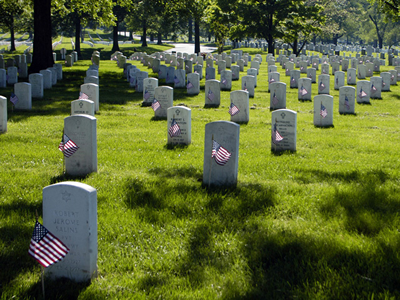Memorial Day, Rural Americans and Tradition
Editorial by Urban C. Lehner
The Progressive Farmer
Every Memorial Day, flags are placed on all 260,000 graves at Arlington National Cemetery. (Photo courtesy of U.S. Army) |
Once upon a time, Memorial Day meant something important to Americans. To some Americans, it still does. To others, it's just a three-day weekend. On Decoration Day, as it used to be called, how many give a thought to our fallen soldiers, much less decorate their graves?
Farmers may find that a strange question. For one thing, time off isn't in the Memorial Day picture for many of them. They're in the field, planting.
For another, farmers and ranchers tend to be among the Americans for whom the day still has meaning. They might not be able to take off a day, much less three, but some will spare an hour or two for a Memorial Day service.
In city and country, the observance of Memorial Day has always been strongest when the country's war losses were biggest. It was in 1868, three years after the end of the Civil War -- still America's deadliest with more than 600,000 slain -- that the holiday was first proclaimed. The years after World War I (more than 100,000 deaths) and World War II (more than 400,000 deaths) were also high points for the holiday.
Today we have soldiers in harm's way in Iraq and Afghanistan. Compared to earlier wars, our battlefield losses are small. Yet to the families who suffer them, those losses are as painful as any in our bigger wars. More painful, perhaps, as there are fewer families in similar circumstances with whom to share the sorrow of a holiday dedicated to remembering those lost.
Maybe it's the shared suffering that explains why Memorial Day traditions seem stronger in the countryside. As Agriculture Secretary Tom Vilsack has pointed out, rural Americans provide 44% of the military's personnel even though they represent only 16% of the population. They're more likely to have fallen family members to remember.
What accounts for this disproportional contribution? It's not, contrary to the stereotype, that country people are all mindless my-country-right-or-wrong flag wavers, any more than all city dwellers are America-hating would-be citizens of the world. Most Americans, urban and rural, are patriotic. Most would agree with Mark Twain that "Patriotism is supporting your country all the time, and your government when it deserves it."
The real explanation, Secretary Vilsack says, is that working the land makes farmers appreciate the value of "giving back." In a speech at the Commodity Classic convention in March, Vilsack described farmers and ranchers teaching their children that to reap the land's bounty, they have to give back to it -- and "a country is no different. You can't keep taking from the country. You instill in your youngsters an understanding and a responsibility to give something back and it's reflected in their service."
The secretary makes a good point, but the answer could be even simpler. It could be that being in tune with the seasonal rhythms of nature is conducive to adherence to traditions of all sort: family, religion, military service and, yes, the keeping of holiday customs.
To be sure, the countryside is not as traditional as it once was. Methamphetamine is epidemic. Divorce happens. In some country towns the only surviving business is the saloon, and with the passing of the grocery store and the gas station and the coffee shop, neighborliness ebbs. Yet, all that said, traditional ways remain stronger in the country than in the city.
Memorial Day devotees have urged Congress to end the three-day holiday it decreed in 1971 and restore May 30 as the day for decorating dead soldiers' graves. The fans may be right in thinking our culture would pay more heed to the day's meaning if it had its own date. Still, it's hard to imagine lawmakers embracing this proposal. Three-day weekends are popular with voters. Businesses that benefit from holiday travel like them, too.
Memorial Day may have strayed from its roots, but it receives more official and formal observance than many holidays. Every Memorial Day, soldiers place flags on all 260,000 graves at Arlington National Cemetery. Elsewhere across the country, Boy Scouts, Girl Scouts and others do likewise. Churches hold Memorial Day services.
As Memorial Day 2011 rolls around, it should comfort the devotees that there are still some Americans who remember how to celebrate it.
Urban C. Lehner is the Vice President of The Progressive Farmer.
